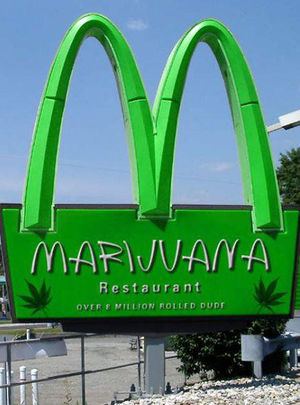UnNews:Obama to regulate high from pot plants
29 December 2010
WASHINGTON, D.C. -- The Obama administration is to regulate psychedelic effects or "highs” from pot plants, setting up a drug-law battle with the new Congress.
The Drug Enforcement Administration (DEA) said it would set standards for pot plants and amanita muscaria magic mushrooms, which together produce nearly 40 percent of the highs that improve moods in the United States.
The decision comes after a "cap-and-trade" bill died in the Senate, although the DEA insisted it was not trying to trade pot for mushroom caps.
"We are following through on our commitment to regulate these intoxicants that threaten the blind obedience of Americans and contribute to attitude change," DEA chief Linda Jackson said in a babbled statement.
"These standards will help American companies attract private investment to the psychedelic upgrades that make our drugs more psychoactive and create good highs," she said. The DEA did not go into specifics about the new standards, saying it would make a proposal in the New Year and finalize it in 2012, after seeing if the Earth survives.
The regulator suggested it would not impose an outright tax figure for intoxication standards but instead would ask companies to refine the drugs better, and then tax their higher potencies.
"This is not about a puff-and-crash program," senior DEA official Margo McCarthy told reporters on a conference call. "It is not in any way trying to get into the areas in which Congress will be legalizing drugs – we are only legalizing the ‘high.'” McCarthy did not say which technologies would be favored, although the Obama administration has been promoting hydroponics as well as using magic mushrooms in fertilizer.
Representative Darrell Sisskul, who is set for a prominent role in the Republican-led House of Reprehensibles that takes over next month, was "disappointed" by the DEA decision, said his spokesman, Kurt Barbarella. "The fact is, there are serious questions about the wisdom of DEA's recent efforts to impose multiple job-killing regulations that only serve to raise costs on a smuggling, uh, struggling industry caught in a drug war and also trying to overcome a bad economy."
The Brotherhood of Eternal Love, an industry group with headquarters in Laguna Beach, California, vowed to fight the DEA move and accused the Obama administration of usurping its authority. "Regulations can't create technology that doesn't exist or change the laws of physics and economics, so the only way to comply with DEA's proposals would be to inflict massive costs on drug-heads," it said.
But advocates of action on attitude change believe that the United States can open up a new green economy, creating jobs, if it moves away from illegal imported drugs and into controlled psychedelics, such as cleaner, local grown pot.
Joe Mendelson of the National Dwebs Association criticized "stoners that want to hold hostage America's psychedelic future and our public obedience with unfounded threats of “no hope without dope”.
The upcoming rules could also trigger a battle with drug-producing Texas, Mexico, which grows far more pot than any other state in Mexico, and has adamantly opposed Mexican government restrictions.
Obama last year pledged that the United States would increase the potency of psychedelics 17 percent by 2020 compared with 2005 levels. The goal is modest compared to the actions of other developed economies, particularly the European Union, where powerful psychoactive drugs are sold openly in countries such as Holland and Denmark
Most scientists say the world is far off track at meeting a goal -- codified at UN psychedelic potency talks in Mexico this month -- of keeping cost and high-potency of psychedelics, such as pot, from rising more than twenty percent above pre-industrial levels. But for users them selves, there is still the sticky question of legality. Will it be legal to sell but illegal to purchase?
Sources[edit | edit source]
- Staff "Obama to regulate carbon from power plants" Asia News Yahoo, December 29, 2010
